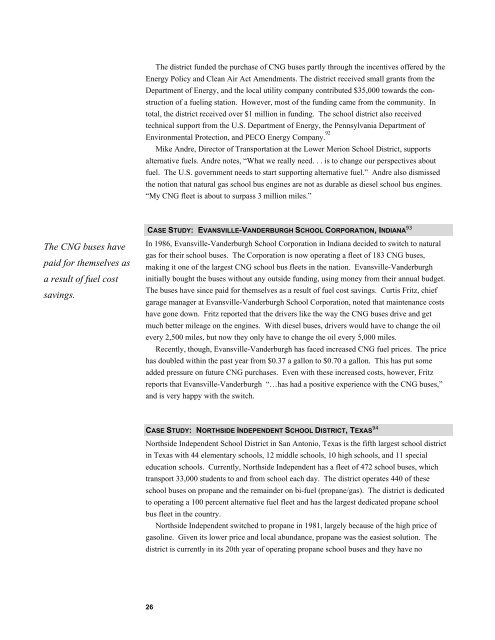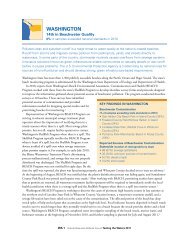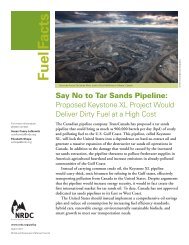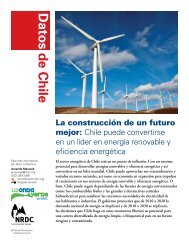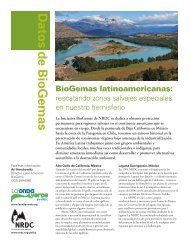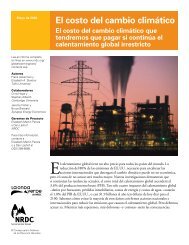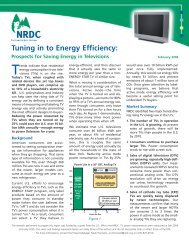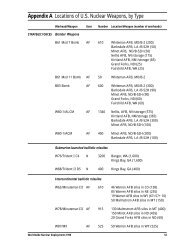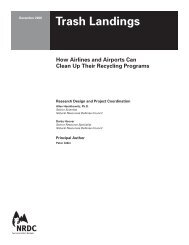NRDC: No Breathing in the Aisles: Diesel Exhaust Inside School ...
NRDC: No Breathing in the Aisles: Diesel Exhaust Inside School ...
NRDC: No Breathing in the Aisles: Diesel Exhaust Inside School ...
Create successful ePaper yourself
Turn your PDF publications into a flip-book with our unique Google optimized e-Paper software.
The CNG buses have<br />
paid for <strong>the</strong>mselves as<br />
a result of fuel cost<br />
sav<strong>in</strong>gs.<br />
The district funded <strong>the</strong> purchase of CNG buses partly through <strong>the</strong> <strong>in</strong>centives offered by <strong>the</strong><br />
Energy Policy and Clean Air Act Amendments. The district received small grants from <strong>the</strong><br />
Department of Energy, and <strong>the</strong> local utility company contributed $35,000 towards <strong>the</strong> construction<br />
of a fuel<strong>in</strong>g station. However, most of <strong>the</strong> fund<strong>in</strong>g came from <strong>the</strong> community. In<br />
total, <strong>the</strong> district received over $1 million <strong>in</strong> fund<strong>in</strong>g. The school district also received<br />
technical support from <strong>the</strong> U.S. Department of Energy, <strong>the</strong> Pennsylvania Department of<br />
Environmental Protection, and PECO Energy Company. 92<br />
Mike Andre, Director of Transportation at <strong>the</strong> Lower Merion <strong>School</strong> District, supports<br />
alternative fuels. Andre notes, “What we really need. . . is to change our perspectives about<br />
fuel. The U.S. government needs to start support<strong>in</strong>g alternative fuel.” Andre also dismissed<br />
<strong>the</strong> notion that natural gas school bus eng<strong>in</strong>es are not as durable as diesel school bus eng<strong>in</strong>es.<br />
“My CNG fleet is about to surpass 3 million miles.”<br />
CASE STUDY: EVANSVILLE-VANDERBURGH SCHOOL CORPORATION, INDIANA 93<br />
In 1986, Evansville-Vanderburgh <strong>School</strong> Corporation <strong>in</strong> Indiana decided to switch to natural<br />
gas for <strong>the</strong>ir school buses. The Corporation is now operat<strong>in</strong>g a fleet of 183 CNG buses,<br />
mak<strong>in</strong>g it one of <strong>the</strong> largest CNG school bus fleets <strong>in</strong> <strong>the</strong> nation. Evansville-Vanderburgh<br />
<strong>in</strong>itially bought <strong>the</strong> buses without any outside fund<strong>in</strong>g, us<strong>in</strong>g money from <strong>the</strong>ir annual budget.<br />
The buses have s<strong>in</strong>ce paid for <strong>the</strong>mselves as a result of fuel cost sav<strong>in</strong>gs. Curtis Fritz, chief<br />
garage manager at Evansville-Vanderburgh <strong>School</strong> Corporation, noted that ma<strong>in</strong>tenance costs<br />
have gone down. Fritz reported that <strong>the</strong> drivers like <strong>the</strong> way <strong>the</strong> CNG buses drive and get<br />
much better mileage on <strong>the</strong> eng<strong>in</strong>es. With diesel buses, drivers would have to change <strong>the</strong> oil<br />
every 2,500 miles, but now <strong>the</strong>y only have to change <strong>the</strong> oil every 5,000 miles.<br />
Recently, though, Evansville-Vanderburgh has faced <strong>in</strong>creased CNG fuel prices. The price<br />
has doubled with<strong>in</strong> <strong>the</strong> past year from $0.37 a gallon to $0.70 a gallon. This has put some<br />
added pressure on future CNG purchases. Even with <strong>the</strong>se <strong>in</strong>creased costs, however, Fritz<br />
reports that Evansville-Vanderburgh “…has had a positive experience with <strong>the</strong> CNG buses,”<br />
and is very happy with <strong>the</strong> switch.<br />
CASE STUDY: NORTHSIDE INDEPENDENT SCHOOL DISTRICT, TEXAS 94<br />
<strong>No</strong>rthside Independent <strong>School</strong> District <strong>in</strong> San Antonio, Texas is <strong>the</strong> fifth largest school district<br />
<strong>in</strong> Texas with 44 elementary schools, 12 middle schools, 10 high schools, and 11 special<br />
education schools. Currently, <strong>No</strong>rthside Independent has a fleet of 472 school buses, which<br />
transport 33,000 students to and from school each day. The district operates 440 of <strong>the</strong>se<br />
school buses on propane and <strong>the</strong> rema<strong>in</strong>der on bi-fuel (propane/gas). The district is dedicated<br />
to operat<strong>in</strong>g a 100 percent alternative fuel fleet and has <strong>the</strong> largest dedicated propane school<br />
bus fleet <strong>in</strong> <strong>the</strong> country.<br />
<strong>No</strong>rthside Independent switched to propane <strong>in</strong> 1981, largely because of <strong>the</strong> high price of<br />
gasol<strong>in</strong>e. Given its lower price and local abundance, propane was <strong>the</strong> easiest solution. The<br />
district is currently <strong>in</strong> its 20th year of operat<strong>in</strong>g propane school buses and <strong>the</strong>y have no<br />
26


